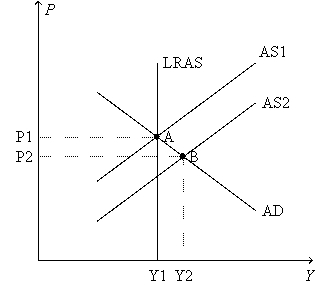Exam 33: Aggregate Demand and Aggregate Supply
Exam 1: Ten Principles of Economics281 Questions
Exam 2: Thinking Like an Economist451 Questions
Exam 3: Interdependence and the Gains From Trade353 Questions
Exam 4: The Market Forces of Supply and Demand467 Questions
Exam 5: Elasticity and Its Application409 Questions
Exam 6: Supply, Demand, and Government Policies459 Questions
Exam 7: Consumers, Producers, and the Efficiency of Markets363 Questions
Exam 8: Application: The Costs of Taxation353 Questions
Exam 9: Application: International Trade333 Questions
Exam 10: Externalities352 Questions
Exam 11: Public Goods and Common Resources270 Questions
Exam 12: The Design of the Tax System397 Questions
Exam 13: The Costs of Production434 Questions
Exam 14: Firms in Competitive Markets381 Questions
Exam 15: Monopoly427 Questions
Exam 16: Monopolistic Competition416 Questions
Exam 17: Oligopoly325 Questions
Exam 18: The Markets for the Factors of Production361 Questions
Exam 19: Earnings and Discrimination335 Questions
Exam 20: Income Inequality and Poverty312 Questions
Exam 21: The Theory of Consumer Choice354 Questions
Exam 22: Frontiers of Microeconomics262 Questions
Exam 23: Measuring a Nations Income343 Questions
Exam 24: Measuring the Cost of Living358 Questions
Exam 25: Production and Growth335 Questions
Exam 26: Saving, investment, and the Financial System381 Questions
Exam 27: The Basic Tools of Finance336 Questions
Exam 28: Unemployment533 Questions
Exam 29: The Monetary System366 Questions
Exam 30: Money Growth and Inflation312 Questions
Exam 31: Open-Economy Macroeconomics: Basic Concepts346 Questions
Exam 32: A Macroeconomic Theory of the Open Economy300 Questions
Exam 33: Aggregate Demand and Aggregate Supply386 Questions
Exam 34: The Influence of Monetary and Fiscal Policy on Aggregate Demand334 Questions
Exam 35: The Short-Run Trade-Off Between Inflation and Unemployment306 Questions
Exam 36: Five Debates Over Macroeconomic Policy179 Questions
Select questions type
Suppose a stock market crash makes people feel poorer.This decrease in wealth would induce people to desire
(Multiple Choice)
4.8/5  (40)
(40)
Since the end of World War II,the U.S.has almost always had rising prices and an upward trend in real GDP.To explain this
(Multiple Choice)
4.9/5  (39)
(39)
If the economy is initially at long-run equilibrium and aggregate demand declines,then in the long run the price level
(Multiple Choice)
4.8/5  (41)
(41)
Suppose workers notice a fall in their nominal wage but are slow to notice that the price of things they consume have fallen by the same percentage.They may infer that the reward to working is
(Multiple Choice)
4.8/5  (32)
(32)
Which part of real GDP fluctuates most over the course of the business cycle?
(Multiple Choice)
4.8/5  (39)
(39)
Optimism
Imagine that the economy is in long-run equilibrium. Then, perhaps because of improved international relations and increased confidence in policy makers, people become more optimistic about the future and stay this way for some time.
-Refer to Optimism.What happens to the expected price level and what's the result for wage bargaining?
(Multiple Choice)
4.8/5  (38)
(38)
Which of the sentences concerning the aggregate demand and aggregate supply model is correct?
(Multiple Choice)
4.8/5  (33)
(33)
In 1986,OPEC countries increased their production of oil.This caused
(Multiple Choice)
4.7/5  (38)
(38)
Other things the same,as the price level decreases it induces greater spending on
(Multiple Choice)
4.8/5  (42)
(42)
In order to understand how the economy works in the short run,we need to
(Multiple Choice)
4.9/5  (33)
(33)
Which of the following shifts aggregate demand to the left?
(Multiple Choice)
4.9/5  (38)
(38)
If the price level is higher than expected,firms might raise their production in the short run if
(Multiple Choice)
4.7/5  (35)
(35)
Which of the following,other things the same,would make the price level decrease and real GDP increase?
(Multiple Choice)
4.7/5  (40)
(40)
Figure 33-2.  -Refer to Stock Market Boom 2014.In the long run,the change in price expectations created by the stock market boom shifts
-Refer to Stock Market Boom 2014.In the long run,the change in price expectations created by the stock market boom shifts
(Multiple Choice)
4.9/5  (43)
(43)
The discovery of a large amount of previously-undiscovered oil in the U.S.would shift
(Multiple Choice)
4.8/5  (32)
(32)
Showing 161 - 180 of 386
Filters
- Essay(0)
- Multiple Choice(0)
- Short Answer(0)
- True False(0)
- Matching(0)